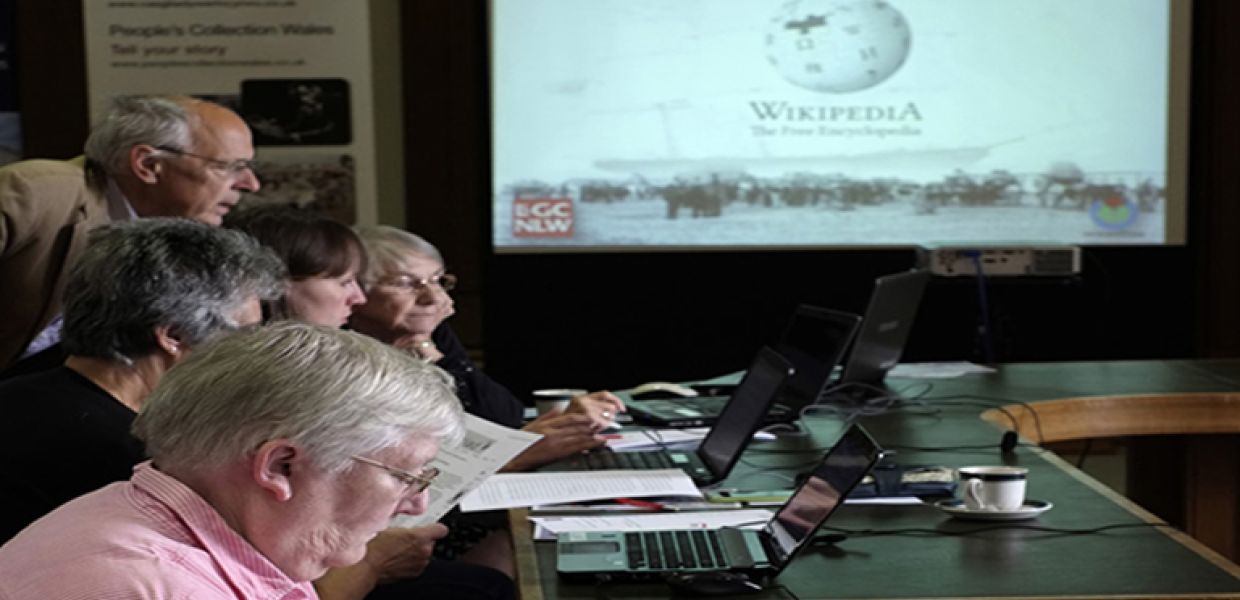Exploring our impact at the National Library of Wales
Dafydd Tudur and Jason Evans tell us about their experiences with the Europeana Impact Playbook at the National Library of Wales, from downloading and trialling the Playbook in 2017, to having their Wikimedia project included as part of the five impact assessments to be developed with the support of Europeana in 2018.

- Title:
- Patagonia Edit-a-thon and Bring-a-long
- Creator:
- Jason J. Evans
- Date:
- 2017
- Copyright:
- CC BY-SA
Why we are interested in impact/how we got involved
At a time when knowledge and information seems to be accessible anywhere, at anytime, the need for cultural organisations to design and measure the impact of their activities is greater than ever before. Realising this, I immediately saw the value of the Europeana Impact Playbook as a step towards having a standard method of measuring the National Library of Wales’s impact. Attending the ‘Culture 3.0’ event hosted by the EU Presidency in Tallinn in October gave me an opportunity to learn more about the Playbook from some of those who had been working on it, and consider further how it could be applied to some of our own projects.
A trial run of the playbook
In the weeks after the event in Tallinn, I discussed the Playbook with colleagues at the National Library of Wales and ran a workshop to try it out on one of our upcoming activities. Having participated in the workshop, my colleagues could see how the Playbook led to discussions and insights that could not only allow us to measure, but also to increase the impact of our activities. I have shared some of my first-hand experience of using the Playbook in a use case.
Taking that a little bit further: NLW + national Wikimedian
Following a change in policy in 2013 which supported open access to its historical collections, the National Library of Wales appointed a Wikipedian in Residence in order to proactively share its data via Wikimedia platforms and to support the development of Welsh language and Wales-related content on Wikipedia. Fast forward several years and the library is now one of just a handful of organisations worldwide who employ a full-time Wikimedian. The ‘National Wikimedian’ has a remit to develop open access initiatives within the institution, and in Wales more widely. They regularly support and organise Wikipedia editing workshops and edit-a-thon events, support a team of Wiki volunteers at the National Library and share library data via Wikimedia Commons and Wikidata.
Since 2015, the Library’s partnership with Wikimedia UK has led to the release of nearly 15,000 openly licensed images, 10,000 new Wikipedia articles and the creation of 33,000 Wikidata items. We know that Wikipedia articles containing our images have been viewed 380 million times since the beginning of the project and we know that over 350 people have been involved in our events, but beyond this we have very little insight into the impact of this collaboration. Like many institutions we must balance open access with income generation, so it would be incredibly powerful to understand the economic value of open access initiatives. What does our local economy gain from access to rich cultural data and all the outreach work which goes on as a result?
We would like to understand the impact on the reach and reputation of the National Library. But more importantly, how can we measure the impact of our Wiki projects on those who view, use, or repurpose our open content? And what might be the impact on volunteers gaining computer literacy and language skills through learning to edit Wikipedia?
The development of the Impact Playbook presents a golden opportunity for us to dig deeper into the actual and perceived impacts of our Wikimedia projects. We are delighted we will be the focus of one of Europeana’s five impact assessments in 2018 as part of the next phase of the Impact Playbook, and we hope our findings will help inform future projects and strengthen the case for open access as an effective vehicle for meeting the institution’s strategic goals.
More information
To stay up-to-date with the latest news in impact and with the development of the Impact Playbook, visit our Impact webpages and join our community on LinkedIn
